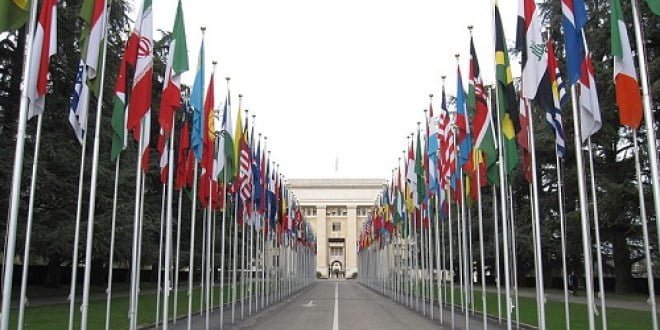
47th Round of Geneva International Discussions
The 47th round of the Geneva International Discussions (GID) – the multilateral forum to address security and humanitarian consequences of the Russo-Georgian War of August 2008 – was held on April 2-3.
Positions taken: Georgia
In a statement issued regarding the April 2-3 negotiations, the Georgian Ministry of Foreign Affairs (MFA) said the Georgian delegation spoke of the security and humanitarian problems that the conflict-affected population is facing in Abkhazia and Tskhinvali region/South Ossetia, as well as in areas adjacent to the occupation line.
The MFA said in its statement, that the Georgian participants widely discussed “grave consequences” of Russian Federation’s “illegal occupation and factual annexation” of the two Georgian regions, as well as the process of “enhanced militarization and constant military drills, which cause destabilization not only in Georgia, but the whole region.”
Tbilisi also denounced illegal detentions and kidnapping along the occupation line, erection of barbed wire fences and other artificial barriers, which also impose restrictions on the local population to access their plots of land and “seriously escalates tensions on the ground.”
The members of delegation said, with its “illegal military presence on Georgia’s occupied territories, the Russian Federation continues using its force against the Georgian statehood,” and called on Moscow to fulfill its international obligations. “To ensure this, the Georgian representatives raised the issue of creating international security mechanisms in Abkhazia and Tskhinvali regions as well as the necessity to withdraw the Russian occupation forces from Georgia,” the MFA said in its statement.
Special focus was made on the need to investigate deaths of Archil Tatunashvili, Giga Otkhozoria and Davit Basharuli, and the need for “restoring justice” in these cases. MFA said, co-chairs and participants from US and Tbilisi expressed their concern on the recent death of Irakli Kvaratskhelia, a 29-year-old Georgian citizen, who died under unclear circumstances in Abkhazia.
Against this background, Tbilisi called for “immediate resumption” of the Incident Prevention and Response Mechanism (IPRM) in Gali – “without preconditions.”
Participants from Tbilisi also denounced restriction of the freedom of movement, human rights violations and ethnic discrimination in Georgian-populated Gali and Akhalgori districts, as well as and “grave violation” of other fundamental rights that “negatively affect the socio-economic conditions of the local population.”
The MFA added that due to “destructive approach” of participants from Moscow, Sokhumi and Tskhinvali, who left the room “to avoid discussion on the issue”, the return of refugees and internally displaced persons from Abkhazia and Tskhinvali regions could not be discussed.
Positions taken: Russia, Tskhinvali, Sokhumi
The April 3 statement of the Russian Foreign Ministry (MID) said “the Russian, Abkhaz and South Ossetian delegations stressed importance of GID,” due to which the situation “at the borders between Abkhazia and South Ossetia with Georgia” remains relatively stable for more than ten years now.
MID said, “considering the necessity of exchanging information and solution of practical issues” of the people, the Abkhaz and Georgian participants agreed to hold “a technical meeting” of IPRM in Gali in near future.
“Russian, Abkhaz and South Ossetian delegations once again emphasized that military actions of the United States and NATO on Georgia’s territory pose the main challenge to the regional security. Exercises of the NATO-member states and partners on the Georgian territory are openly threatening,” MID said.
Russian Foreign Ministry then added that Tbilisi and Washington have been “reintroducing the ten-year-old phraseology on the necessity to withdraw Russian military forces from the entire Georgian territory,‘ ensure ‘international security measures’ and etc,” which has brought the discussions into a deadlock.
MID also said the majority of participants assessed the situation “in the border areas” as “stable.” According to Moscow, the statistics attest that there were no serious problems with freedom of movement along the occupation line, and that the number of detention cases “does not exceed the average.”
The statement also said that representatives from Moscow and Tskhinvali spoke on the “provocative actions” of certain Georgian civil society organizations adjacent to the occupation line, whose “propaganda rallies are fraught with the most dangerous consequences and are in no one’s interest.”
It also said that participants from Moscow and Sokhumi shared information on the “circumstances of the suicide” of Irakli Kvaratskhelia, and noted that investigation into “this tragic incident” is still underway.
Sokhumi and Tskhinvali echoed the Russian Foreign Ministry’s messages, with their Moscow-backed ‘foreign ministries’ saying that NATO-led military drills in Georgia, and in particular, the recent NATO-Georgia Exercise, “pose a serious threat to the security in the region.”
GID co-chair assessments
The GID co-chairs said in their joint press communiqué, that “the security situation on the ground had been challenged especially by the death of Georgian citizen Irakli Kvaratskhelia in the custody of Russian Federation Border Guards in the Gali district on 10 March 2019,” and called on “the relevant participants to share all existing information in a timely manner.”
On the restrictions and closures of crossing points, connecting the two occupied regions to the rest of the country, the co-chairs and co-moderators reiterated that “these measures were not justified as a means to providing public health benefits,” and stressed that both IPRMs and hotlines should have been used.
The co-chairs also underlined the importance of providing advance notice on military activities in the region and other sensitive issues. They also noted that “due to a walkout by some participants, the issue of internally displaced persons/refugees could not be addressed.”
The next round of the GID is scheduled for July 2-3, 2019.
This post is also available in: ქართული Русский